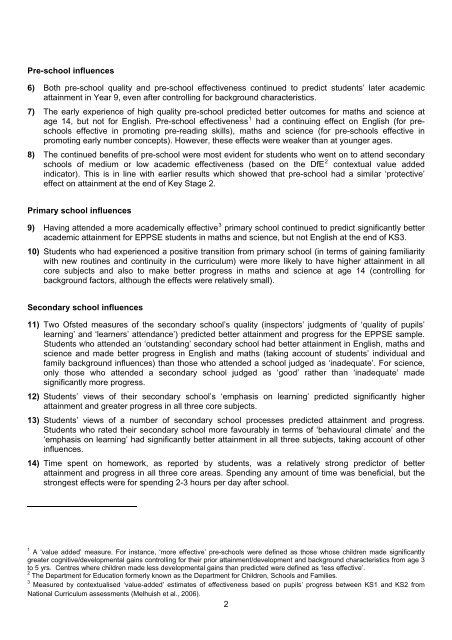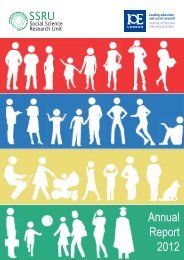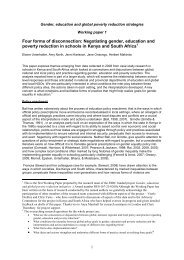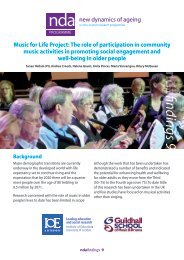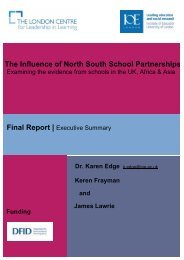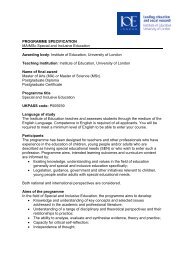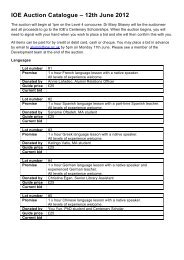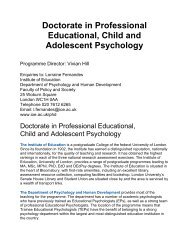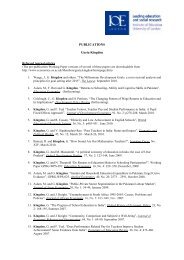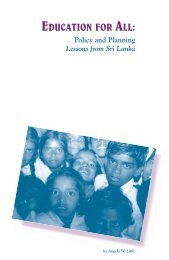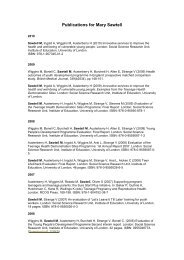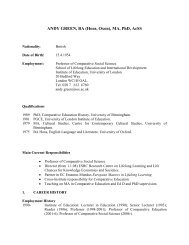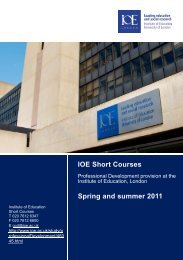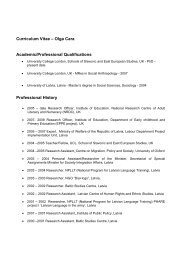Influences on students' attainment - Institute of Education, University ...
Influences on students' attainment - Institute of Education, University ...
Influences on students' attainment - Institute of Education, University ...
Create successful ePaper yourself
Turn your PDF publications into a flip-book with our unique Google optimized e-Paper software.
Pre-school influences<br />
6) Both pre-school quality and pre-school effectiveness c<strong>on</strong>tinued to predict students’ later academic<br />
<strong>attainment</strong> in Year 9, even after c<strong>on</strong>trolling for background characteristics.<br />
7) The early experience <strong>of</strong> high quality pre-school predicted better outcomes for maths and science at<br />
age 14, but not for English. Pre-school effectiveness 1 had a c<strong>on</strong>tinuing effect <strong>on</strong> English (for preschools<br />
effective in promoting pre-reading skills), maths and science (for pre-schools effective in<br />
promoting early number c<strong>on</strong>cepts). However, these effects were weaker than at younger ages.<br />
8) The c<strong>on</strong>tinued benefits <strong>of</strong> pre-school were most evident for students who went <strong>on</strong> to attend sec<strong>on</strong>dary<br />
schools <strong>of</strong> medium or low academic effectiveness (based <strong>on</strong> the DfE 2 c<strong>on</strong>textual value added<br />
indicator). This is in line with earlier results which showed that pre-school had a similar ‘protective’<br />
effect <strong>on</strong> <strong>attainment</strong> at the end <strong>of</strong> Key Stage 2.<br />
Primary school influences<br />
9) Having attended a more academically effective 3 primary school c<strong>on</strong>tinued to predict significantly better<br />
academic <strong>attainment</strong> for EPPSE students in maths and science, but not English at the end <strong>of</strong> KS3.<br />
10) Students who had experienced a positive transiti<strong>on</strong> from primary school (in terms <strong>of</strong> gaining familiarity<br />
with new routines and c<strong>on</strong>tinuity in the curriculum) were more likely to have higher <strong>attainment</strong> in all<br />
core subjects and also to make better progress in maths and science at age 14 (c<strong>on</strong>trolling for<br />
background factors, although the effects were relatively small).<br />
Sec<strong>on</strong>dary school influences<br />
11) Two Ofsted measures <strong>of</strong> the sec<strong>on</strong>dary school’s quality (inspectors’ judgments <strong>of</strong> ‘quality <strong>of</strong> pupils’<br />
learning’ and ‘learners’ attendance’) predicted better <strong>attainment</strong> and progress for the EPPSE sample.<br />
Students who attended an ‘outstanding’ sec<strong>on</strong>dary school had better <strong>attainment</strong> in English, maths and<br />
science and made better progress in English and maths (taking account <strong>of</strong> students’ individual and<br />
family background influences) than those who attended a school judged as ‘inadequate’. For science,<br />
<strong>on</strong>ly those who attended a sec<strong>on</strong>dary school judged as ‘good’ rather than ‘inadequate’ made<br />
significantly more progress.<br />
12) Students’ views <strong>of</strong> their sec<strong>on</strong>dary school’s ‘emphasis <strong>on</strong> learning’ predicted significantly higher<br />
<strong>attainment</strong> and greater progress in all three core subjects.<br />
13) Students’ views <strong>of</strong> a number <strong>of</strong> sec<strong>on</strong>dary school processes predicted <strong>attainment</strong> and progress.<br />
Students who rated their sec<strong>on</strong>dary school more favourably in terms <strong>of</strong> ‘behavioural climate’ and the<br />
‘emphasis <strong>on</strong> learning’ had significantly better <strong>attainment</strong> in all three subjects, taking account <strong>of</strong> other<br />
influences.<br />
14) Time spent <strong>on</strong> homework, as reported by students, was a relatively str<strong>on</strong>g predictor <strong>of</strong> better<br />
<strong>attainment</strong> and progress in all three core areas. Spending any amount <strong>of</strong> time was beneficial, but the<br />
str<strong>on</strong>gest effects were for spending 2-3 hours per day after school.<br />
1 A ‘value added’ measure. For instance, ‘more effective’ pre-schools were defined as those whose children made significantly<br />
greater cognitive/developmental gains c<strong>on</strong>trolling for their prior <strong>attainment</strong>/development and background characteristics from age 3<br />
to 5 yrs. Centres where children made less developmental gains than predicted were defined as ‘less effective’.<br />
2 The Department for Educati<strong>on</strong> formerly known as the Department for Children, Schools and Families.<br />
3 Measured by c<strong>on</strong>textualised ‘value-added’ estimates <strong>of</strong> effectiveness based <strong>on</strong> pupils’ progress between KS1 and KS2 from<br />
Nati<strong>on</strong>al Curriculum assessments (Melhuish et al., 2006).<br />
2


